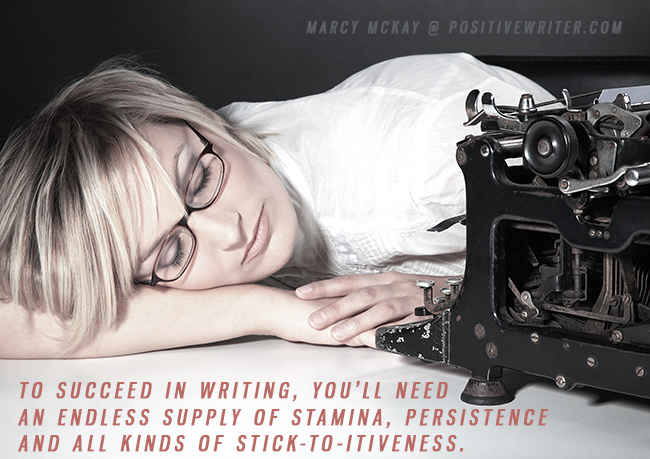Marcy McKay is a regular contributor here on Positive Writer, so it is with great pride that I congratulate her on her first Novel, Pennies from Burger Heaven. It’s a wonderful gem, don’t miss it! Join me in congratulating Marcy in the comments.
Writing is hard work. In 1995, a voice woke me from a dream and told me to write a book. I did.

Well, okay, maybe I freaked out for months about my pending fame and fortune first, then it took several more years for me to complete that blasted thing (which pretty much sucked and will never see the light of day). But, by Gawd, I did it. I wrote a novel, then another, and still one more.
Every day, I got to my computer by 5 a.m. to toil over my current work-in-progress before my husband and young children woke up. The kids went to school and the grownups went to their jobs. It took me a mere 20 years since for my fourth completed manuscript to become my debut novel, Pennies from Burger Heaven (a literary suspense by SkipJack Publishing).
For all the writers out there, I have this piece of advice for you…
Never. Give. up.
That sounds cliche, but it’s true. To succeed in writing, you’ll need an endless supply of stamina, persistence and all kinds of stick-to-itiveness.
Don’t get me wrong. You’re human. You’re going to be discouraged. You’ll face criticism and rejection, as well as doubt yourself more times than not. You’ll want to give up. You might even do so for days, weeks, months or years.
If you really want to to succeed, then you need to dig deep within yourself to keep trying. No matter what. You must return to that blank page, send another query letter, review your final Kindle proof for the twentieth time, or tackle whatever ever literary task you’re trying to accomplish.
Here are three ways to help you persevere.
1. Focus more on the craft
It’s a simple and generous rule of life that whatever you practice, you will improve at. –Elizabeth Gilbert, Big Magic
I know it’s not sexy, and you’d rather hear about the miracle way to shoot to the top of the New York Times’ Bestseller’s list, but too many people rush to publication, then regret it later. Big time. Their characters are one-dimensional with predictable outcomes, or they put out a sloppy, nonfiction book. You get one chance to make a good first impression. Make the most of it.
FYI, if you’ve just started writing or haven’t been at it very long, then your words may be lacking. That’s both reasonable and to be expected. Stop fretting because you don’t pen a masterpiece on your first try. Be willing to be bad in order to become great.
On the flip side, you have to put in the time and effort. Talking about writing isn’t writing. Posting cool author quotes isn’t writing. Only writing is writing. Researching and outlining count, too, but don’t stay stuck in this phase too long, because then it becomes procrastination. Shut up, sit down and start typing.
Get feedback on your work, enter contests (Positive Writer is starting an exciting new writing contest next week, so subscribe and stay tuned), share your story when it’s ready, then move on to the next one. Read wonderful books for pleasure. It’s really that simple, and truly that hard.
2. Take Risks
It is impossible to live without failing at something, unless you live so cautiously that you might as well not have lived at all, in which case you have failed by default. –J.K. Rowling, Harry Potter
Take a creative writing course. Go to that conference where your dream agent is presenting. Query that literary journal about your short story. It might not work out in your favor as soon as you’d like, but it will never happen unless you at least try. Failure is a necessary part of creativity. Stop fearing it because if you do not fail, then you’re not trying hard enough. Every “no” takes you one step closer to that glorious “yes.”
If you just started writing, don’t fixate on publication, publication, publication. Focus more on the smaller successes:
You’ve written every day for two weeks now. Hurray!
You outlined your entire novel. Congratulations!
You volunteered to read your opening paragraph at a workshop even though it terrified you to do so. Fantastic!
Small steps are the way to giant victories.
3. Believe in yourself
What we really want to do is what we are really meant to do. When we do what we are meant to do…we feel useful. –Julia Cameron, The Artist’s Way
This should probably be #1, but you would’ve ignored this whole post if I did, so I placed it last. Believe in yourself. Some find it easier to stay positive by surrounding yourself with other writers (online and in person) because they understand your struggles, can offer accountability and even feedback.
Keep in mind, it needs to be the right set of writers. Humans can be critical, snarky and jealous. Yes, you need to hear the truth about where to improve your work, but you also don’t need to be around people who leave you feeling abused.
If you aren’t fortunate enough to have people in your everyday life who understand and appreciate your passion to write, don’t discuss it with them. Seriously, change the subject if they do. More than likely, they’re too afraid to honor their dreams, so they don’t want you to break out of the status quo. Ignore them as best as you, but write anyway.
Bottom Line…
Be willing to work hard, face adversity and never give up:
On your dream.
On yourself.
On your writing.
